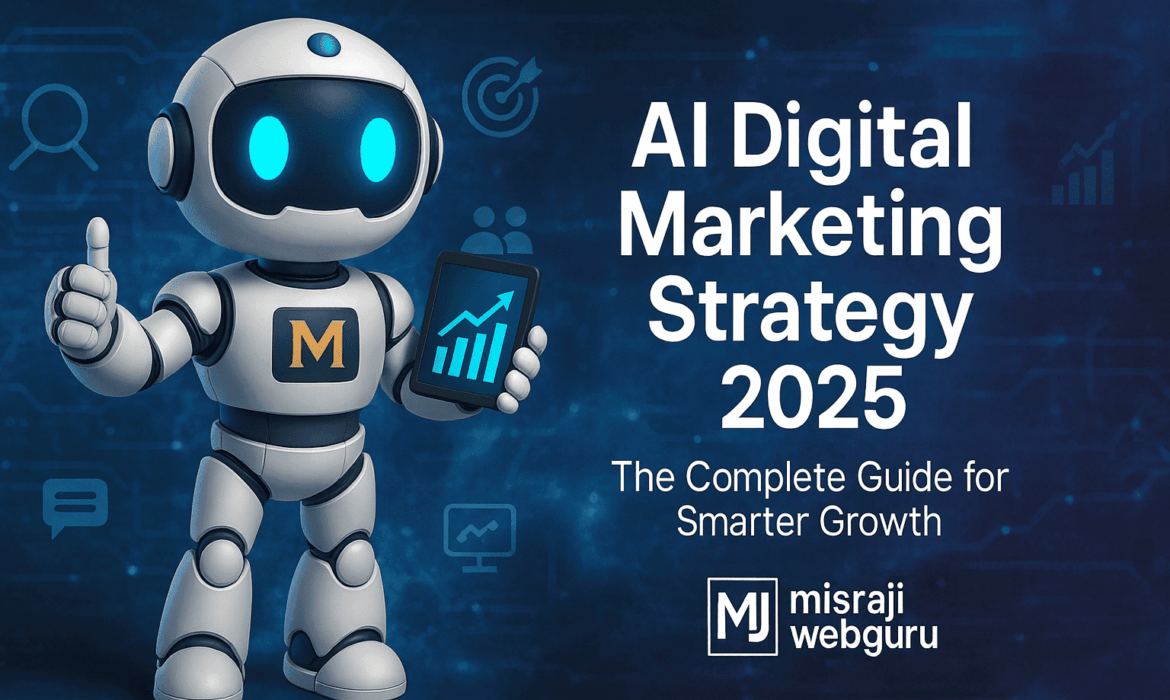
Table of Contents
Introduction: Why AI is Transforming Digital Marketing (400 words)
In 2025, digital marketing isn’t just about visibility—it’s about intelligence. Businesses are no longer asking “Should I use AI?” but rather “How deep can I integrate AI into my marketing?” Artificial Intelligence has moved from being a futuristic buzzword to becoming the invisible engine driving smarter campaigns, deeper personalization, and measurable growth.
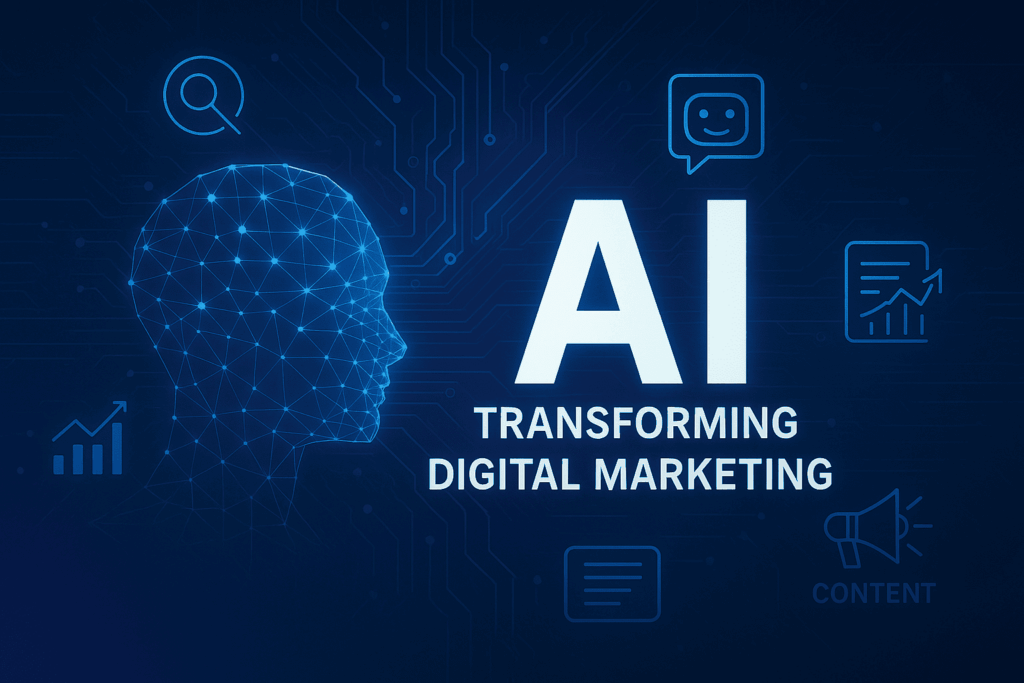
At its core, digital marketing is about connecting with humans—understanding their needs, behaviors, and emotions. Traditionally, this understanding was shaped by analytics reports, surveys, and guesswork. But today, AI can analyze millions of data points in seconds, predicting what a customer wants before they even type it into Google. From AI-powered SEO tools that refine keyword strategies to chatbots that provide real-time customer care, the marketing playbook has been rewritten.
The shift is not just technological—it’s strategic. Businesses that embrace AI today are gaining a competitive edge that compounds over time. Imagine being able to run 100 versions of an ad simultaneously, let machine learning determine the best performer, and scale it instantly. Or using AI-driven emotional analysis to adjust your brand messaging to resonate more deeply with your audience. This isn’t sci-fi—it’s happening right now.
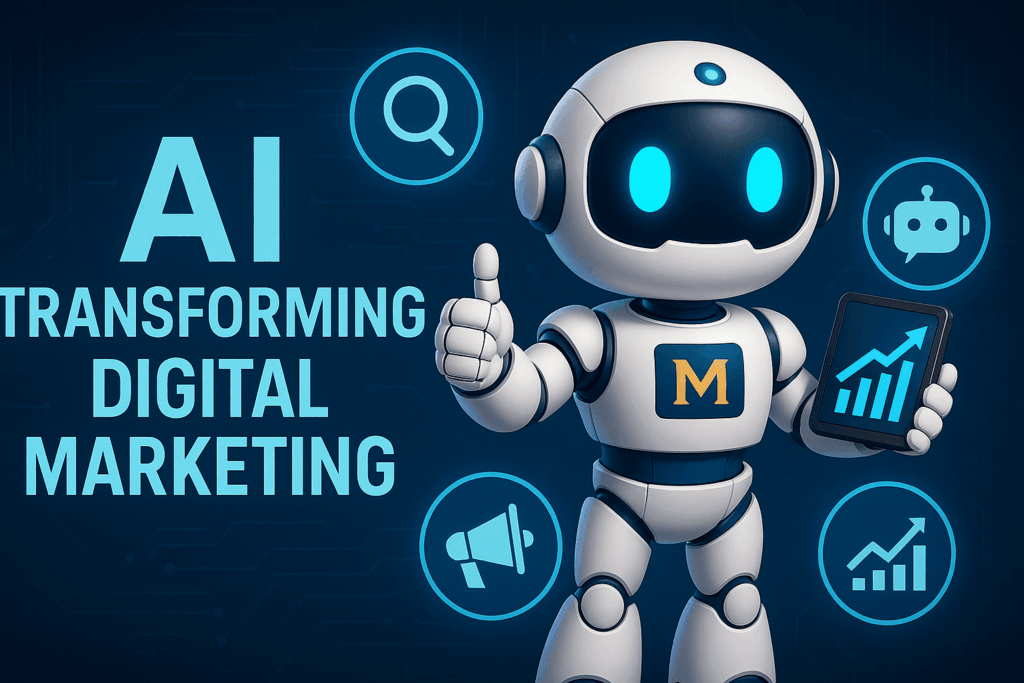
As a premium AI-driven digital marketing company, MisraJiWebGuru has seen first-hand how brands transform when they integrate AI into their strategy. The results are not incremental—they’re exponential. In this blog, we’ll explore how to design an AI digital marketing strategy in 2025, blending the speed of machines with the creativity of humans, to achieve smarter, faster, and more human growth.
Why AI is Transforming Digital Marketing
Digital marketing has always adapted to technology shifts. First came websites, then SEO, then social media, then mobile-first design. But AI is different—it’s not a channel, it’s an intelligence layer that upgrades every single channel you use.
Here’s why AI is fundamentally transforming digital marketing in 2025:
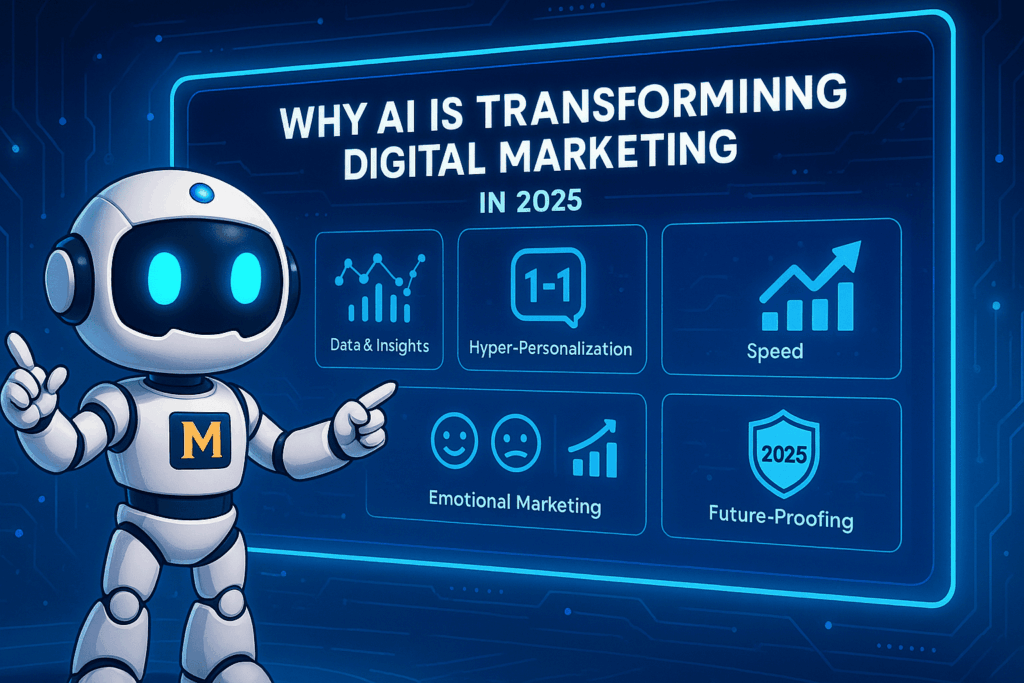
1. Data is Overwhelming—AI Makes it Actionable
Every click, search, and scroll creates data. But data without insight is just noise. AI can process unstructured, massive datasets and turn them into actionable strategies. For example:
- AI SEO tools like RankMath AI can recommend real-time keyword optimizations.
- AI email systems like HubSpot AI predict the best send time for each subscriber.
- AI analytics platforms can spot micro-trends before they go mainstream.
This makes decision-making not only faster but also more accurate.
2. Hyper-Personalization is the New Normal
Gone are the days of sending the same email blast to 10,000 people. In 2025, AI enables 1-to-1 personalization at scale.
- Netflix recommends shows uniquely to you—your marketing can do the same.
- E-commerce stores now use AI to change product recommendations based on real-time browsing behavior.
- Social ads can adjust headline, image, and CTA dynamically depending on who sees them.
Personalization used to be optional; today, it’s the expectation. Customers expect brands to know them.
3. Speed of Execution → Smarter Campaigns
AI doesn’t just optimize—it accelerates.
- Campaign testing that used to take weeks is now done in hours with AI simulations.
- AI-powered copywriters like Jasper generate ad variations instantly.
- Predictive AI tools can tell you which content format (video, blog, carousel) will likely convert better.
This speed gives businesses an edge in a market where trends can change overnight.
4. AI Enables Emotional Marketing
Yes, machines can read emotions—at least digitally. Sentiment analysis tools now analyze customer reviews, tweets, and comments to measure emotions around a brand. This allows businesses to:
- Shift campaigns from product features → to emotional storytelling.
- Detect when negative sentiment is rising before a PR crisis escalates.
- Craft ads that speak to feelings, not just logic.
This is where AI + human creativity meet, creating campaigns that feel personal and empathetic.
5. Cost Efficiency and ROI
AI automates repetitive tasks: bidding on ads, sending follow-ups, A/B testing. That means businesses spend less on operations and more on creative and strategy.
- AI PPC optimizers ensure you don’t waste money on poor clicks.
- AI customer service chatbots reduce staffing costs while improving 24/7 response.
- AI content tools reduce turnaround time for blogs, graphics, and social content.
The result: higher ROI with fewer resources.
6. Future-Proofing Against Competition
Brands that ignore AI in 2025 risk digital irrelevance. If your competitor is running AI-powered dynamic ads and you’re not, your CPC (cost per click) will skyrocket. If they’re optimizing SEO in real-time and you’re still updating monthly, you’ll lose ranking battles.
AI is no longer “optional innovation”—it’s the new baseline.
Key Takeaway:
AI isn’t replacing marketers—it’s amplifying them. Just as calculators didn’t replace mathematicians, AI won’t replace strategists. But those who use AI will always outperform those who don’t.
Benefits of AI in Marketing
AI is not just a shiny new tool—it solves some of the biggest problems marketers face: time, personalization, accuracy, and scale. Let’s explore the main benefits in 2025.
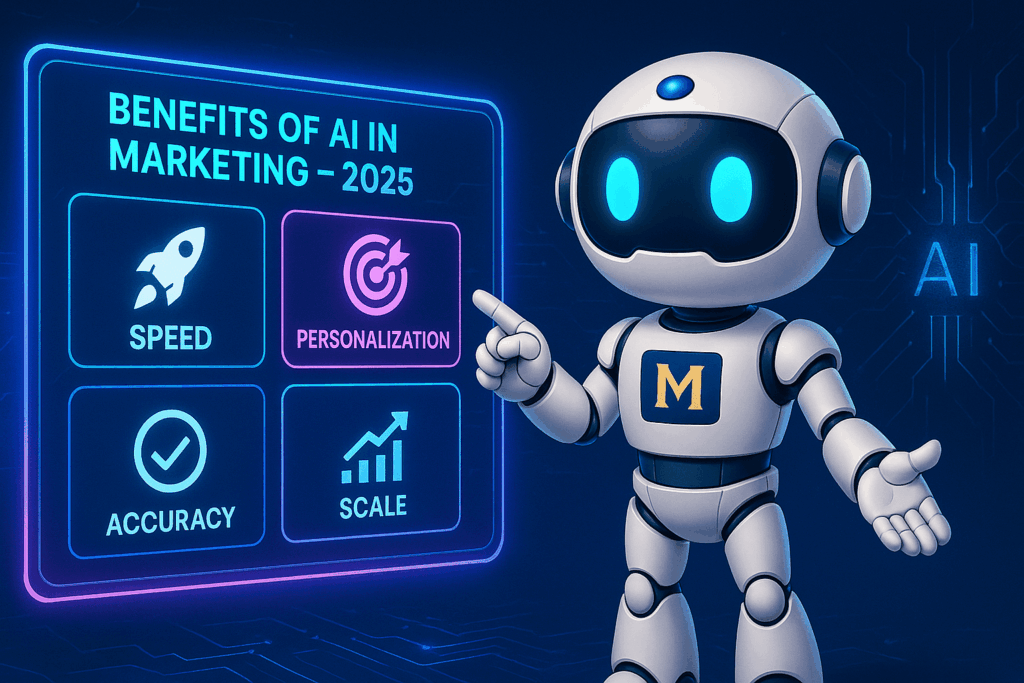
1. Speed: From Weeks to Minutes
Traditionally, marketing teams spent weeks analyzing performance data, brainstorming content, and running A/B tests. With AI:
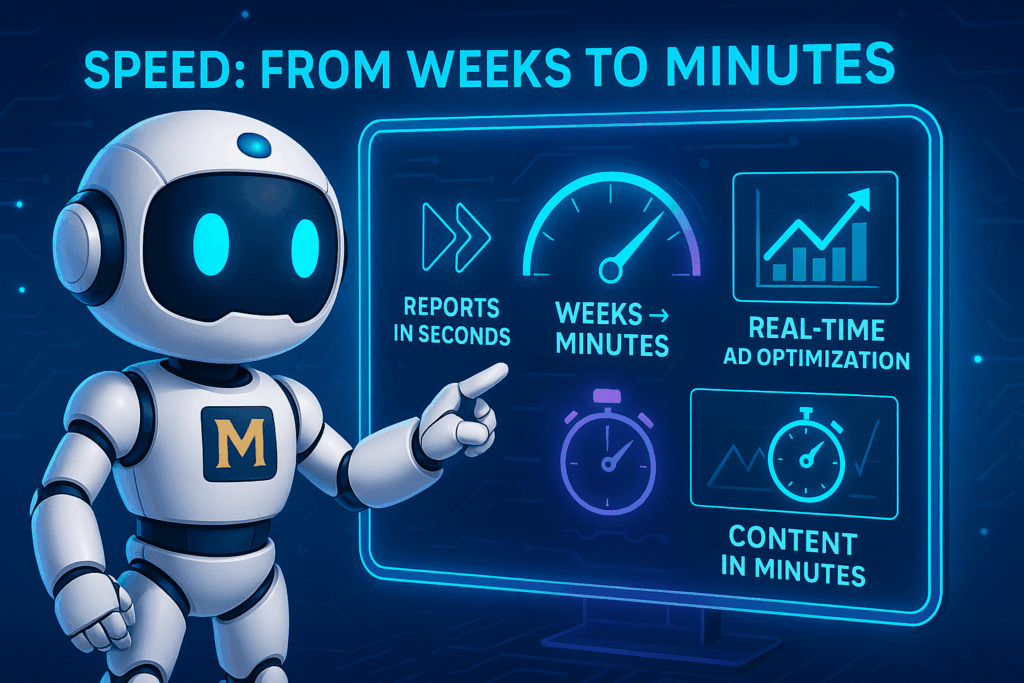
- Reports generate in seconds. Tools like Google Analytics AI Insights automatically suggest reasons for traffic spikes or drops.
- Ad optimization happens in real-time. Instead of testing headlines for 2 weeks, AI can simulate thousands of ad variations instantly and push the top performer live.
- Content creation accelerates. AI tools such as Jasper or Copy.ai can produce blogs, emails, and ad copies in minutes, freeing human marketers to focus on strategy.
Speed means you stay ahead of competitors and capitalize on trends as they emerge—not after they’re gone.
2. Personalization at Scale
Personalization used to mean inserting a name in an email subject line. In 2025, AI has elevated personalization to predictive behavior modeling:
- E-commerce → AI recommends products based on real-time browsing and purchase history.
- Email Marketing → Each subscriber gets a different subject line, send time, and offer, all optimized by AI.
- Social Ads → Creatives adapt dynamically. Example: If a user often clicks videos, they see video ads. If they engage with images, the ad switches to a carousel.
Personalization drives higher conversions, loyalty, and lifetime customer value.
3. Automation of Repetitive Tasks
AI eliminates repetitive tasks that drain human energy:
- Automating follow-up emails after a webinar.
- Handling customer FAQs via chatbots 24/7.
- Optimizing PPC bidding without constant manual monitoring.
- Auto-scheduling social posts at the best-performing times.
This automation doesn’t just save time—it improves consistency. Customers never experience delays, and campaigns run smoothly without human error.
4. Deeper Customer Insights
AI doesn’t just give surface-level analytics; it interprets intent and emotion.
- Sentiment analysis tools detect positive/negative tones in reviews or tweets.
- Predictive analytics forecast what customers are likely to buy next.
- Heatmap AI tools (like Hotjar AI) show which parts of a webpage capture attention.
Businesses can anticipate customer needs instead of reacting after the fact.
5. Cost Efficiency
Marketing budgets often leak money due to guesswork or inefficiency. AI plugs those leaks:
- Ad spend is optimized → every click is analyzed, and poor-performing ads are cut instantly.
- Customer support costs drop → AI chatbots reduce the need for large support teams.
- Content creation costs shrink → AI drafts the base, humans polish it.
The result: better ROI with smaller budgets.
6. Smarter Creativity
Ironically, AI doesn’t kill creativity—it amplifies it. Instead of spending days generating content ideas, marketers can:
- Use AI to brainstorm headlines, taglines, or visual concepts.
- Let AI test 50 variations of a creative while the human team focuses on storytelling.
- Blend data-driven insights with human imagination for “creative intelligence.”
✅ Key Point:
AI’s biggest benefit isn’t replacing marketers—it’s freeing them from repetitive tasks, so they can focus on strategy, storytelling, and innovation.
Core AI Digital Marketing Strategies
Now let’s break down the most impactful strategies brands are using in 2025.
1. SEO with AI
Search Engine Optimization is no longer static. Google’s algorithms now rely heavily on AI-driven ranking signals, meaning your SEO strategy must also be AI-driven.
How AI Transforms SEO:
- Keyword Research → Tools like Surfer SEO AI and SEMrush AI suggest not only keywords but also search intent variations.
- Content Optimization → AI can scan the top 20 search results and recommend exact word count, headings, FAQs, and tone needed to rank.
- Voice Search Optimization → AI predicts voice-based queries (“Hey Siri, how do I…?”) and optimizes content accordingly.
- Predictive SEO → Instead of reacting to ranking drops, AI forecasts potential declines and recommends pre-emptive fixes.
Example: Rank Math’s Content AI plugin doesn’t just grade your SEO—it suggests semantic keywords and internal linking strategies in real time.
Result: Your content ranks faster, stays optimized, and captures more long-tail opportunities.
2. PPC & AI Optimization
Pay-Per-Click advertising (Google Ads, Meta Ads, LinkedIn Ads) is evolving into AI-powered real-time bidding wars.
Why AI is Essential in PPC:
- Automated Bidding → AI ensures you never overspend on clicks by adjusting bids instantly.
- Dynamic Ad Copy → AI generates multiple versions of ad headlines and descriptions and serves the best performers.
- Audience Targeting → Machine learning predicts who is most likely to convert, going beyond demographics to behavior and intent.
- Fraud Detection → AI systems filter out invalid or bot clicks, saving ad spend.
Example: Google Ads’ Smart Bidding uses AI to analyze thousands of signals (device, time, location, browsing history) to maximize conversions per dollar.
Result: Higher CTR (Click-Through Rate), lower CPA (Cost Per Acquisition), and better ROAS (Return on Ad Spend).
Key Takeaway So Far:
- AI SEO ensures your organic reach is optimized.
- AI PPC ensures your paid reach is maximized.
Together, they form the backbone of a 2025-ready AI Digital Marketing Strategy.
AI in Branding & Emotional Targeting
Branding is no longer about logos and colors—it’s about emotions and connections. In 2025, AI enables businesses to tap into the psychology of customers in ways that were previously impossible.
How AI Enhances Branding:
- Sentiment Analysis
- Tools like MonkeyLearn or IBM Watson analyze customer reviews, tweets, and comments to detect positive, neutral, or negative emotions.
- Brands can adjust messaging in real-time to align with audience mood.
- Emotional Copywriting
- AI tools generate multiple ad copies with different emotional tones—joy, urgency, nostalgia—then test which resonates most with a specific audience.
- Visual Branding with AI
- Platforms like MidJourney or DALL-E help design on-brand visuals instantly.
- Consistency across platforms builds recognition.
Example: A skincare brand using AI can detect that its target audience responds better to “confidence and empowerment” rather than “beauty and attraction.” Ads are then shifted to match this emotional tone, creating deeper loyalty.
Takeaway:
AI doesn’t replace the soul of branding—it sharpens it, ensuring your emotional message is authentic, consistent, and personalized.
AI Chatbots & Automation
Customer expectations in 2025 are clear: instant, 24/7, personalized support. AI-powered chatbots and automation make this possible.
Benefits of AI Chatbots:
- 24/7 Availability: Customers don’t wait for office hours.
- Natural Conversations: With GPT-powered bots, chats feel human-like.
- Multichannel Support: Chatbots work on websites, WhatsApp, Messenger, and even Instagram DMs.
- Conversion Boosting: Bots don’t just answer—they guide users toward purchases.
Beyond Chatbots → Full Automation
- Lead Nurturing: AI automates follow-up emails with personalized product suggestions.
- Sales Pipeline Management: AI tracks where prospects are in the funnel and nudges them forward.
- Reputation Management: AI scans online mentions and auto-responds with brand-safe messages.
Example: E-commerce sites use chatbots to answer size queries, recommend products, and even apply discount codes—turning browsers into buyers instantly.
Takeaway:
AI chatbots are no longer just “support bots.” They’re sales assistants, brand ambassadors, and lead generators working round the clock.
Tools & Platforms Powering AI Marketing
AI isn’t just theory—it’s tools you can use today. Some leading platforms in 2025:
- SEO & Content
- RankMath AI → On-page SEO optimization, content grading, keyword suggestions.
- Surfer SEO → AI content editor based on SERP analysis.
- Copywriting & Branding
- Jasper AI → Long-form blogs, ad copy, email content.
- Copy.ai → Short-form creative content.
- PPC & Ads
- Google Smart Bidding → AI-driven ad spend optimization.
- AdCreative.ai → Generates high-converting ad visuals & copy.
- Customer Engagement
- Drift / Intercom AI Bots → Sales + customer support.
- ManyChat AI → WhatsApp, Instagram, Messenger automation.
- Analytics & Insights
- SEMrush AI → Predictive SEO & traffic forecasting.
- MonkeyLearn → Customer sentiment & text analysis.
Case Studies / Real-World Examples
- E-commerce (Amazon)
- Uses AI for product recommendations → 35% of sales come from AI-driven suggestions.
- Streaming (Netflix)
- AI personalization of movie suggestions → keeps users engaged longer, reducing churn.
- Fashion Retail (H&M)
- AI-powered supply chain → predicts fashion trends and ensures faster product launches.
- Local Business Example
- A restaurant in New York used AI-driven Google Ads + AI chatbots for reservations → 40% increase in bookings within 2 months.
Takeaway:
Whether you’re Amazon or a local café, AI-driven marketing delivers measurable results—faster growth, smarter campaigns, and happier customers.
Challenges of AI in Digital Marketing
While AI is powerful, adopting it isn’t without obstacles. Businesses must balance efficiency with ethics, automation with authenticity.
1. Data Privacy Concerns
AI thrives on data. But with stricter laws (like GDPR, India’s DPDP Act), companies must ensure data usage is transparent, ethical, and secure. Misusing AI-driven personalization can feel intrusive, damaging trust.
2. Over-Automation Risks
Too much AI can make interactions feel robotic. A chatbot that can’t handle emotional nuance frustrates customers. Brands must keep a human touch in storytelling and customer engagement.
3. High Initial Costs
While AI saves money long-term, implementing tools, training staff, and integrating systems can be expensive for small businesses.
4. Bias in AI Algorithms
AI learns from data, and biased data = biased output. This can affect ad targeting, hiring, or content personalization. Marketers need to monitor outputs to ensure fairness.
5. Constant Evolution
AI tools change rapidly. What works today may be outdated in 6 months. Businesses must be agile and commit to continuous learning.
Takeaway: AI is not “set and forget.” It requires responsible, adaptive, and ethical adoption.
Future Trends in AI Digital Marketing
By 2025 and beyond, expect AI to reshape marketing in these ways:
- Answer Engine Optimization (AEO)
Search engines are shifting toward direct answers. AI-driven optimization will focus on ranking for voice queries and AI search bots (like ChatGPT integrated into Bing/Google). - AI-Generated Video Content
Short-form AI video creators will allow businesses to produce personalized video ads at scale. - Neuro-Marketing with AI
AI will analyze facial expressions, eye tracking, and emotions to predict purchase intent. - AI-Powered Influencer Marketing
Tools will match brands with influencers not just by followers but by engagement, sentiment, and niche audience fit. - Autonomous Marketing Systems
We may soon see self-running campaigns where AI creates, tests, and optimizes ads with minimal human input.
Takeaway: The future of AI marketing isn’t about replacing humans—it’s about creating smarter collaborations between AI and human creativity.
Conclusion
AI is not the future of marketing—it is the present. Businesses that adapt now will dominate tomorrow. From SEO to branding, PPC to chatbots, AI transforms every corner of digital marketing, making campaigns faster, smarter, and more personalized.
But here’s the truth: AI is a tool, not a magic wand. Success depends on how intelligently you combine AI insights with human creativity and empathy. At MisraJiWebGuru, we believe in blending logic with heart—using AI to amplify, not replace, the soul of marketing.
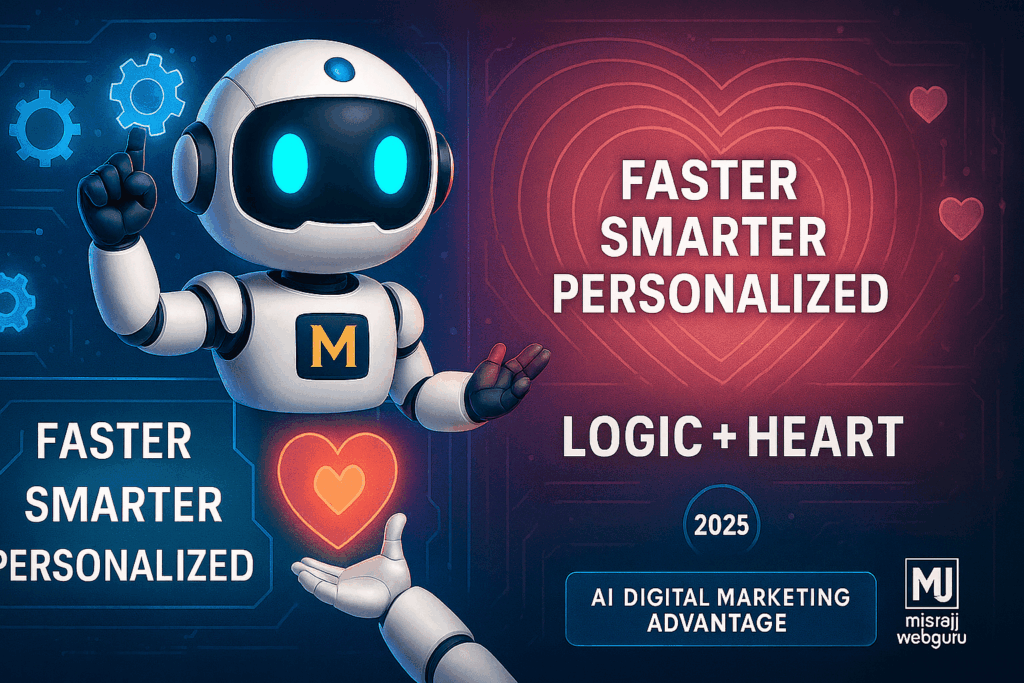
If you’re ready to unlock smarter growth in 2025, let’s talk. Whether it’s SEO, branding, content, or automation—our AI-driven digital marketing strategies are designed to help your brand stand out, connect, and scale.
Contact MisraJiWebGuru today and turn AI into your competitive advantage.
FAQs on AI Digital Marketing Strategy
- What is AI digital marketing?
AI digital marketing uses artificial intelligence tools to automate, analyze, and optimize marketing strategies for better results. - How does AI improve SEO?
AI suggests keywords, optimizes content, and predicts ranking changes to keep websites ahead. - Can AI replace human marketers?
No. AI supports marketers by automating tasks, but human creativity and strategy remain vital. - What is Answer Engine Optimization (AEO)?
AEO focuses on optimizing content to rank as direct answers in AI-driven search engines. - Which AI tools are best for SEO?
RankMath AI, Surfer SEO, and SEMrush AI are top options. - Is AI good for small businesses?
Yes, AI tools scale down easily, making marketing affordable for small brands. - What are AI chatbots used for?
Customer support, lead generation, sales assistance, and reputation management. - Does AI reduce marketing costs?
Yes, by automating repetitive tasks and optimizing ad spend. - How does AI help in branding?
By analyzing emotions, ensuring consistent tone, and creating personalized experiences. - Is AI marketing ethical?
Yes, if used responsibly with customer consent and data transparency. - What are AI-powered ads?
Ads that change headlines, visuals, and CTAs dynamically using AI. - How fast can AI show results?
Typically within weeks, compared to months for traditional campaigns. - Does Google use AI in ranking?
Yes, Google uses AI algorithms like RankBrain and BERT. - Can AI predict customer behavior?
Yes, predictive AI analyzes past data to forecast future purchases. - How does AI affect PPC ads?
AI automates bidding, prevents fraud, and improves targeting accuracy. - What are AI personalization examples?
Product recommendations, tailored emails, and dynamic website content. - Is AI suitable for B2B marketing?
Absolutely, especially for lead scoring, account-based marketing, and CRM automation. - What are risks of AI marketing?
Over-automation, data misuse, and algorithmic bias. - What industries use AI marketing most?
E-commerce, SaaS, finance, healthcare, and media. - How do I start AI digital marketing?
Begin with one area (SEO, PPC, or chatbots), then expand gradually.

